新概念英语第二册Lesson 25 Do the English speak English 课件(共40张PPT)
文档属性
| 名称 | 新概念英语第二册Lesson 25 Do the English speak English 课件(共40张PPT) | 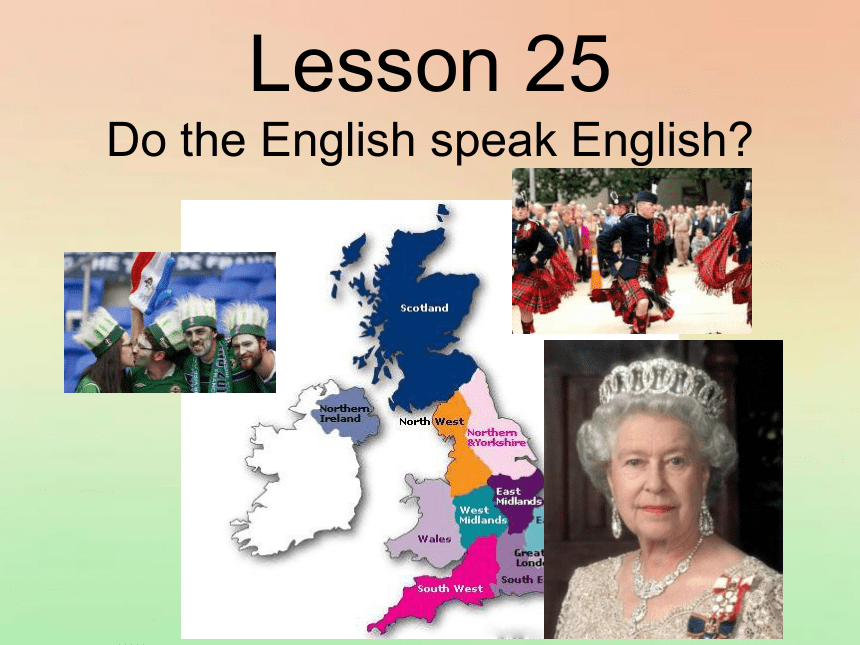 | |
| 格式 | ppt | ||
| 文件大小 | 1.9MB | ||
| 资源类型 | 教案 | ||
| 版本资源 | 新概念英语 | ||
| 科目 | 英语 | ||
| 更新时间 | 2023-12-23 20:42:16 | ||
图片预览

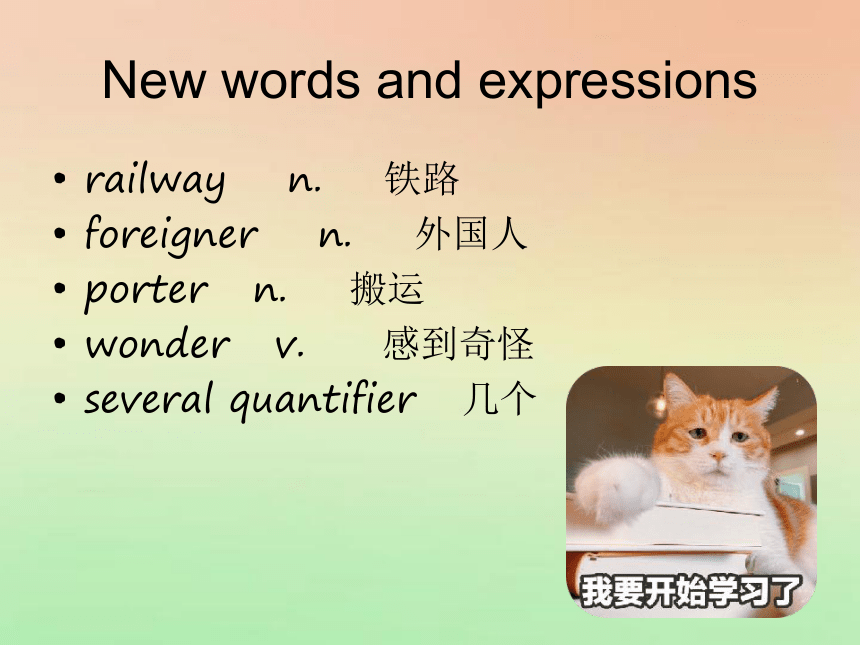
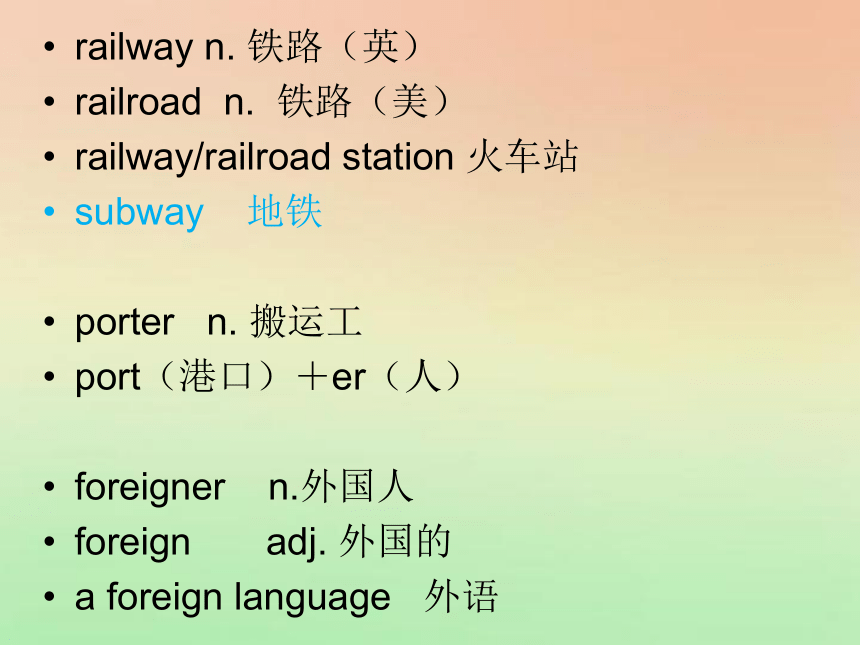
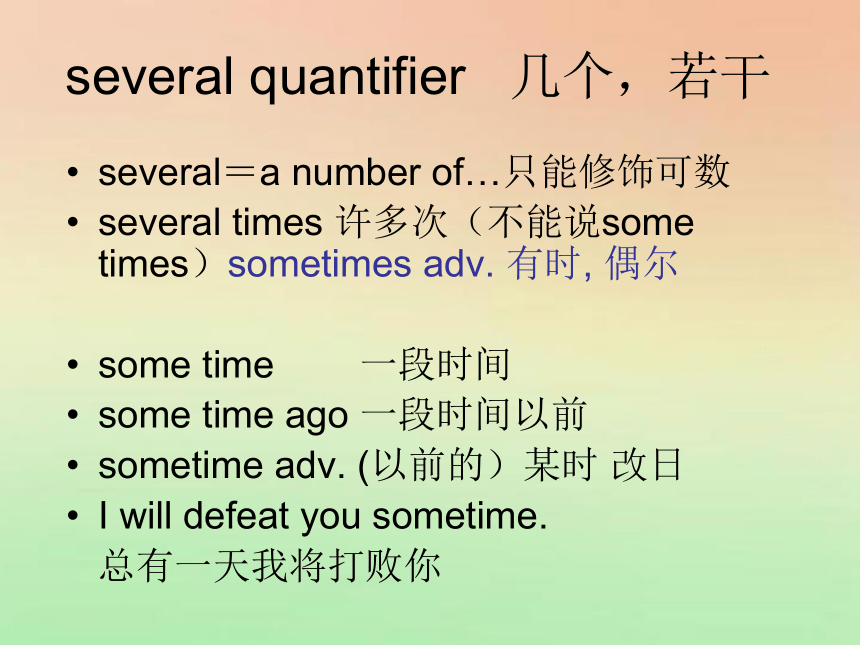
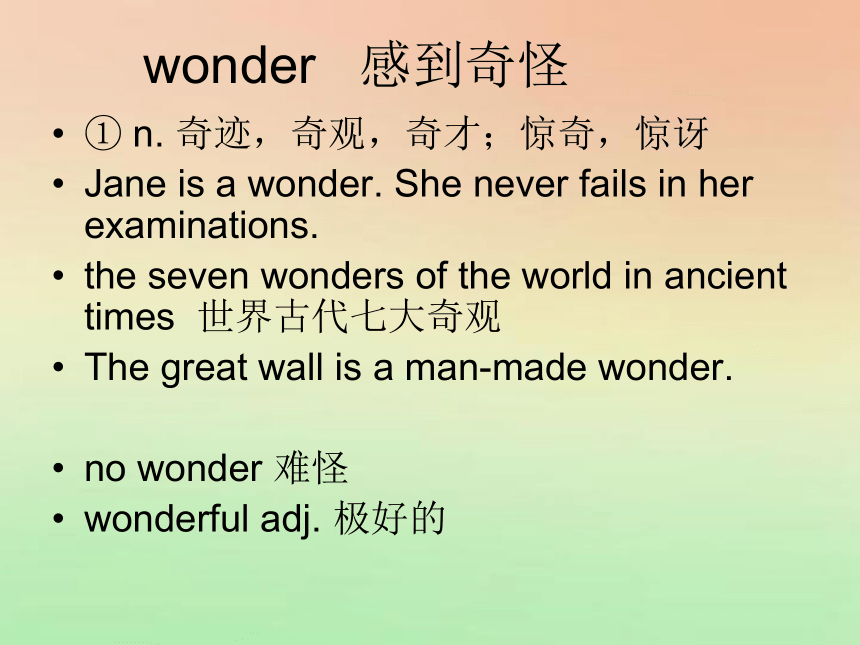
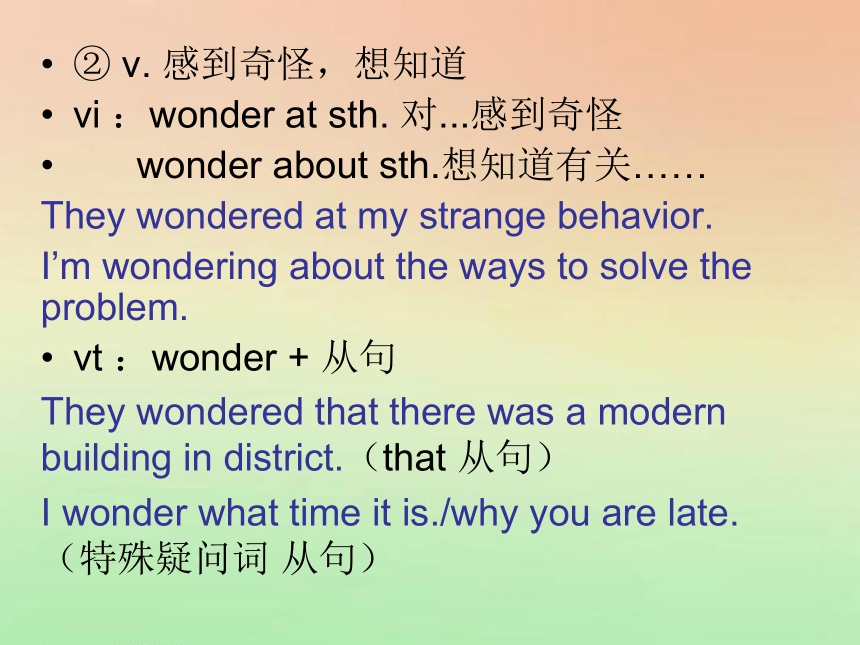
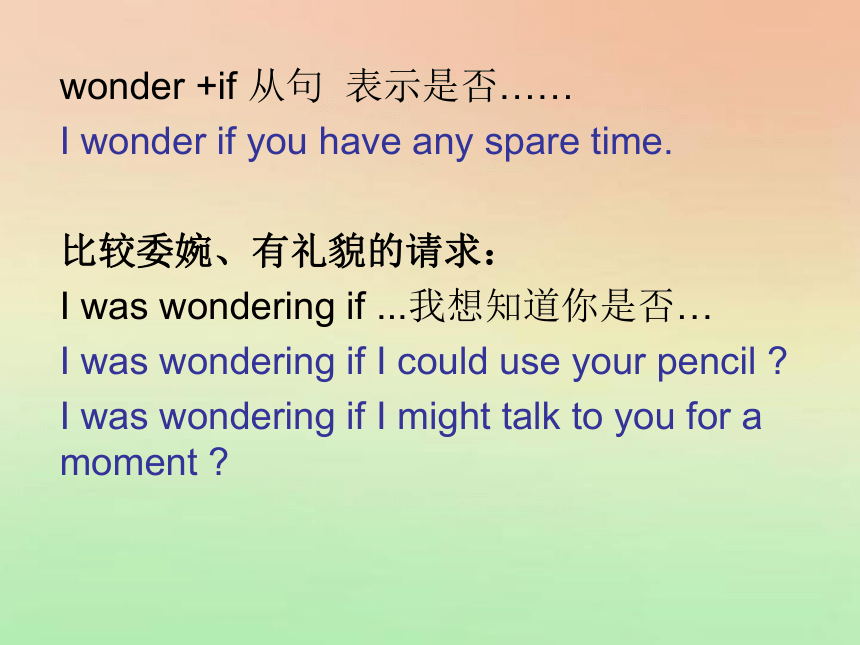
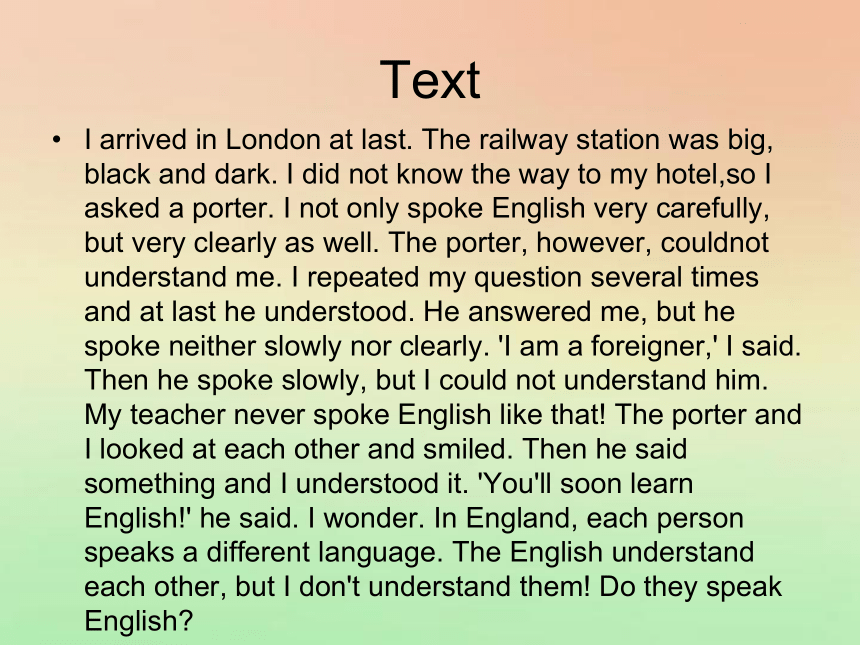
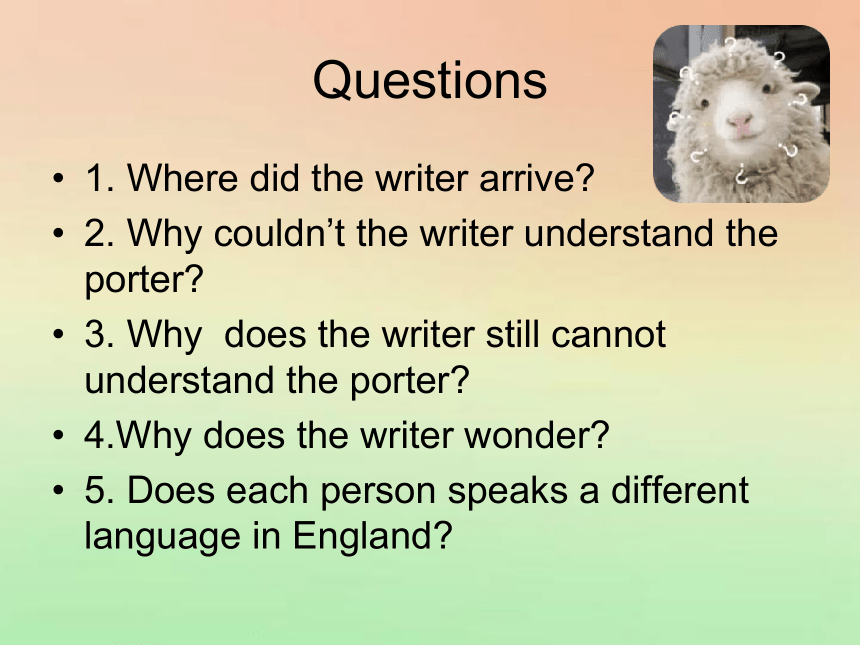

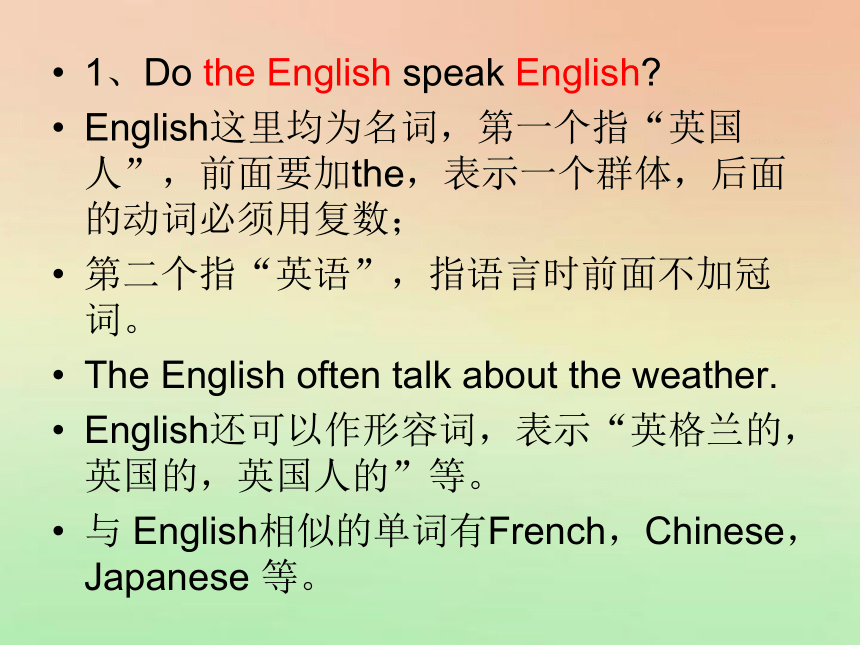
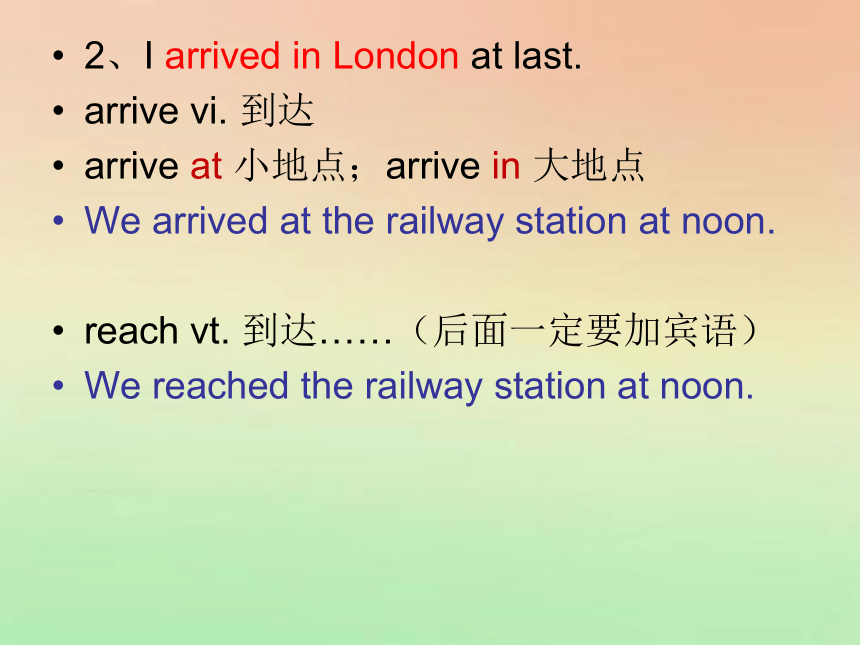
文档简介
(共40张PPT)
Lesson 25
Do the English speak English
New words and expressions
railway n. 铁路
foreigner n. 外国人
porter n. 搬运
wonder v. 感到奇怪
several quantifier 几个
railway n. 铁路(英)
railroad n. 铁路(美)
railway/railroad station 火车站
subway 地铁
porter n. 搬运工
port(港口)+er(人)
foreigner n.外国人
foreign adj. 外国的
a foreign language 外语
several=a number of…只能修饰可数
several times 许多次(不能说some times)sometimes adv. 有时, 偶尔
some time 一段时间
some time ago 一段时间以前
sometime adv. (以前的)某时 改日
I will defeat you sometime.
总有一天我将打败你
several quantifier 几个,若干
① n. 奇迹,奇观,奇才;惊奇,惊讶
Jane is a wonder. She never fails in her examinations.
the seven wonders of the world in ancient times 世界古代七大奇观
The great wall is a man-made wonder.
no wonder 难怪
wonderful adj. 极好的
wonder 感到奇怪
② v. 感到奇怪,想知道
vi :wonder at sth. 对...感到奇怪
wonder about sth.想知道有关……
They wondered at my strange behavior.
I’m wondering about the ways to solve the problem.
vt :wonder + 从句
They wondered that there was a modern building in district.(that 从句)
I wonder what time it is./why you are late.(特殊疑问词 从句)
wonder +if 从句 表示是否……
I wonder if you have any spare time.
比较委婉、有礼貌的请求:
I was wondering if ...我想知道你是否…
I was wondering if I could use your pencil
I was wondering if I might talk to you for a moment
Text
I arrived in London at last. The railway station was big, black and dark. I did not know the way to my hotel,so I asked a porter. I not only spoke English very carefully, but very clearly as well. The porter, however, couldnot understand me. I repeated my question several times and at last he understood. He answered me, but he spoke neither slowly nor clearly. 'I am a foreigner,' I said. Then he spoke slowly, but I could not understand him. My teacher never spoke English like that! The porter and I looked at each other and smiled. Then he said something and I understood it. 'You'll soon learn English!' he said. I wonder. In England, each person speaks a different language. The English understand each other, but I don't understand them! Do they speak English
Questions
1. Where did the writer arrive
2. Why couldn’t the writer understand the porter
3. Why does the writer still cannot understand the porter
4.Why does the writer wonder
5. Does each person speaks a different language in England
Notes on the text 课文注释
1、Do the English speak English
English这里均为名词,第一个指“英国人”,前面要加the,表示一个群体,后面的动词必须用复数;
第二个指“英语”,指语言时前面不加冠词。
The English often talk about the weather.
English还可以作形容词,表示“英格兰的,英国的,英国人的”等。
与 English相似的单词有French,Chinese,Japanese 等。
2、I arrived in London at last.
arrive vi. 到达
arrive at 小地点;arrive in 大地点
We arrived at the railway station at noon.
reach vt. 到达……(后面一定要加宾语)
We reached the railway station at noon.
get to+宾语 到达……
When will you get to BeiJing
How can I get there
home/there 都是副词,副词跟动词连用的时候不需要加介词,
get home 到家;get there 到那
home 是地点副词,如果前面加上冠词或物主代词就成了名词了:例如:go to my home, His home is very far.
3、The railway station was big, black and dark.
并列的表达方式中前面都是用逗号隔开, 最后两个用and连接
balck 是指颜色上的 “黑色”,dark 是指黑暗的、昏暗的(没有光线的)、 深色的
dark blue 深蓝色
4、I did not know the way to my hotel, so I asked a porter.
the way to … 通往……路
Can you tell me the way to…
I don't know the way to the school and where is it
know sth. well 对……很熟悉
I know the boy well.
5、I not only spoke English very carefully, but very clearly as well.
not only...but...as well 不但…而且…
= not only…but also…
I can speak not only Chinese but English as well.
Mary not only found her aunt, but stayed with her for two weeks as well.
Mary不仅找到了她阿姨还在她阿姨家呆了两周.
not only喜欢放在动词的前面,一般遇到实义动词和非实义动词的时候, 习惯放在两者之间
I can not only speak Chinese but English as well.(更习惯的说法)
I not only like my mother but my father as well.
as well 本身的含义是“也、又、还”
If you go home tomorrow, I’ll go as well.
He lent me his pen, and his dictionary as well.
6、He answered me, but he spoke neither slowly nor clearly.
You don't like this book. Neither do I.
你不喜欢这本书, 我也不喜欢。
neither…nor… 既不,也不…(两者都不)
Neither the boss nor his secretary is flying to New York.
老板或者他秘书都不会飞去纽约
Neither you nor I know the answer.
He spoke neither slowly nor clearly.
7、My teacher never spoke English like that!
like这里是介词,表示“像,像……一样”
There’s no one like you. 没有人像你一样。
He speaks like a foreigner.
【Letter Writing】
写信人的地址位于信纸的右上角,被称为“信头”,地址后面总是接写日期,St.是Street的缩略
逗号在地址里表示前者属于后者
I am in class 1,Grade 1.
在日期里, 月和日之间不需要逗号,且月和日的顺序可互换,但在年代之前要有逗号,日期是以序数词出现的,月份一定要是英语字母
February the fourth, 1998 =the fourth of February, 1998,Haidian District,BeiJing,China.(最后一个地点要打上句号)
并列句(compound sentence):
把两个或几个简单句用并列连词 连接起来,则成为一个并列句.
Grammar
平行并列连词:
转折并列连词:
因果并列连词:
选择并列连词:
and, both…and, not only… but also, neither…nor
but,however,while,yet
for,so
or,either…or
常用并列连词 conj.
yet 然而、可是
He studied hard yet he failed.
他学习努力,可是考试仍未及格。
or adv. 或者, 否则
Hurry up ,you will be late.
Hurry up,or you will be late.
某人(事)怎么样.这种情况也适合另一个人(事).
肯定式.too, also, so 否定式.either, neither
either, neither也可以做代词,either是两个中的任何一个,neither 是两个都不
Will you come here this evening or tomorrow
evening
Either is OK. I’m free.
Neither . I’m very busy.
2. I have an apple. Either of you can take it.
I want to eat it. Neither of you can take it.
They are not workers. We are not, either. /Neither are we.
他们不是工人,我们也不是
either… or…或者… 或者…; 要么…要么…
连结并列谓语或表语,状语.
He is either an Englishman or a Frenchman.
他不是英国人便是法国人。
Either you or I must tell him.
either
You may either watch TV at home or play basketball outside.
Either come in or go out.
He is either a doctor or a teacher.
Do you speak either English or French.
You may come either before class or after class.
Either you stay or I do.
当主语由and或both…and连接, 通常采用
复数谓语动词.
Both the girl and the boy are his friends.
He and his father like play football.
Both you and I ___ (be) good students.
Lucy and Lily ____(speak) English very well
are
speak
attention
当主语由neither...nor,either...or,not only...but also 或or 连接时,谓语动词与nor,or,but also后面的词一致,在英语语法中,这被称之为“就近原则”,离动词最近的名词是单数, 整个主语就视为单数;离动词最近的名词是复数, 整个主语就视为复数
Neither he nor I am going to the airport.
Not only Mary but also her parents have gone abroad.
Exercise
Neither he nor I _____(speak) English.
Either I or she _____(be) going to the party.
Either she or I ______(be) going to the party.
Either my brothers or my mother _____ (go) to see my grandpa every week.
Not only Lucy but also Tom’s sister ______ (see) the film for three times
speak
is
am
goes
has seen
请用合适的并列连词把每组句子合并为一个并列句。
1.He was tired. He went to bed.
2. The child hid behind his mother's
skirt. He was afraid of the dog.
He was tired, so he went to bed.
The child hid behind his mother's skirt,for he was afraid of the dog.
3.He made a promise.He didn’t keep it.
He made a promise,but He didn’t keep it.
4.Mary is opening the door.
John is greeting her guests.
Mary is opening the door,and John is greeting her guests.
How to do these exercises.
He isn’t a student. (She)
2. She doesn’t study English. (Mary)
3. They didn’t play football yesterday. ( we)
She isn’t a student, either.
Neither is she.
Mary doesn’t study English, either.
Neither does Mary.
We didn’t play football yesterday, either.
Neither did we.
Choose the right verb form to complete the sentences.
Both my brothers ________ in Italy. ( lives/ live)
Neither of his parents ________ butter and cheese. (likes/ like)
Neither John nor Mary _________ at home. ( was/were)
Both Peter and Mike often _________ football match but neither of them_________ football very well. (watches/watch) (plays/play)
Either you or I ____ going to cook supper tonight. (are/am)
Either my father or my mother _______ dinner. Both my brother and I _______ them on weekends. (cooks/cook) (helps/help)
All the people in my family _____the
housework. (does/do)
live
likes
was
watch
plays
am
cooks
help
do
Fill in the blanks with “ either…or…neither…nor…
both…(and)
My father and my mother are ________ teachers.
They teach in the same school.
2. ______he _______she can join us. We want both of them.
3. The trousers are _______ too short______ too long. Neither of them is the right size.
4. She is ________Chinese ______ Japanese. She comes from Korea.
5. Everyone helps parents with the housework because my parents _________ work.
both
Either or
either or
neither nor
both
Fill in the blanks with the proper verb forms
Either your mother or your father ____(be) a
worker.
2. Either they or he _____(be) a student.
3. Neither you nor Tom ______(have) this book.
4. Both your parents and your sister _____(be) at
home.
is
is
has
are
pattern drills句型练习
Model 1:
T: Tom—Tim—must get up at 6
S1: Tom must get up at 6.
S2: Tim must get up at 6, too.
S3: Both Tom and Tim must get up at 6.
1) Sally– lucy – need to water the garden.
2) Kate—Kelly—went to the museum.
3)Sam—Tom—like to listen to music.
Model 2:
T: Mary—Sue— does not like spicy food
S1: Mary doesn’t like spicy food.
S2: Sue doesn’t like spicy food, either.
Neither does Sue./ Nor does Sue.
S3: Neither Mary nor Sue likes spicy food.
1) The president– the vice-president – didn’t attend the meeting.
2) The teacher—the student—cannot answer the question.
3) Ken—Jim—doesn’t feel well.
Model 3:
T: He—won some money on a horse race—won the lottery
S1: He won some money on a horse race.
S2: He won the lottery, too.
S3: He not only won some money on a hose race but the lottery as well.
1) We—should be bold--cautious.
2) We—should pay attention to grammar--pronunciation.
3) He --was responsible for the campus newspaper—the school magazine.
Byebye
——Rachel
Lesson 25
Do the English speak English
New words and expressions
railway n. 铁路
foreigner n. 外国人
porter n. 搬运
wonder v. 感到奇怪
several quantifier 几个
railway n. 铁路(英)
railroad n. 铁路(美)
railway/railroad station 火车站
subway 地铁
porter n. 搬运工
port(港口)+er(人)
foreigner n.外国人
foreign adj. 外国的
a foreign language 外语
several=a number of…只能修饰可数
several times 许多次(不能说some times)sometimes adv. 有时, 偶尔
some time 一段时间
some time ago 一段时间以前
sometime adv. (以前的)某时 改日
I will defeat you sometime.
总有一天我将打败你
several quantifier 几个,若干
① n. 奇迹,奇观,奇才;惊奇,惊讶
Jane is a wonder. She never fails in her examinations.
the seven wonders of the world in ancient times 世界古代七大奇观
The great wall is a man-made wonder.
no wonder 难怪
wonderful adj. 极好的
wonder 感到奇怪
② v. 感到奇怪,想知道
vi :wonder at sth. 对...感到奇怪
wonder about sth.想知道有关……
They wondered at my strange behavior.
I’m wondering about the ways to solve the problem.
vt :wonder + 从句
They wondered that there was a modern building in district.(that 从句)
I wonder what time it is./why you are late.(特殊疑问词 从句)
wonder +if 从句 表示是否……
I wonder if you have any spare time.
比较委婉、有礼貌的请求:
I was wondering if ...我想知道你是否…
I was wondering if I could use your pencil
I was wondering if I might talk to you for a moment
Text
I arrived in London at last. The railway station was big, black and dark. I did not know the way to my hotel,so I asked a porter. I not only spoke English very carefully, but very clearly as well. The porter, however, couldnot understand me. I repeated my question several times and at last he understood. He answered me, but he spoke neither slowly nor clearly. 'I am a foreigner,' I said. Then he spoke slowly, but I could not understand him. My teacher never spoke English like that! The porter and I looked at each other and smiled. Then he said something and I understood it. 'You'll soon learn English!' he said. I wonder. In England, each person speaks a different language. The English understand each other, but I don't understand them! Do they speak English
Questions
1. Where did the writer arrive
2. Why couldn’t the writer understand the porter
3. Why does the writer still cannot understand the porter
4.Why does the writer wonder
5. Does each person speaks a different language in England
Notes on the text 课文注释
1、Do the English speak English
English这里均为名词,第一个指“英国人”,前面要加the,表示一个群体,后面的动词必须用复数;
第二个指“英语”,指语言时前面不加冠词。
The English often talk about the weather.
English还可以作形容词,表示“英格兰的,英国的,英国人的”等。
与 English相似的单词有French,Chinese,Japanese 等。
2、I arrived in London at last.
arrive vi. 到达
arrive at 小地点;arrive in 大地点
We arrived at the railway station at noon.
reach vt. 到达……(后面一定要加宾语)
We reached the railway station at noon.
get to+宾语 到达……
When will you get to BeiJing
How can I get there
home/there 都是副词,副词跟动词连用的时候不需要加介词,
get home 到家;get there 到那
home 是地点副词,如果前面加上冠词或物主代词就成了名词了:例如:go to my home, His home is very far.
3、The railway station was big, black and dark.
并列的表达方式中前面都是用逗号隔开, 最后两个用and连接
balck 是指颜色上的 “黑色”,dark 是指黑暗的、昏暗的(没有光线的)、 深色的
dark blue 深蓝色
4、I did not know the way to my hotel, so I asked a porter.
the way to … 通往……路
Can you tell me the way to…
I don't know the way to the school and where is it
know sth. well 对……很熟悉
I know the boy well.
5、I not only spoke English very carefully, but very clearly as well.
not only...but...as well 不但…而且…
= not only…but also…
I can speak not only Chinese but English as well.
Mary not only found her aunt, but stayed with her for two weeks as well.
Mary不仅找到了她阿姨还在她阿姨家呆了两周.
not only喜欢放在动词的前面,一般遇到实义动词和非实义动词的时候, 习惯放在两者之间
I can not only speak Chinese but English as well.(更习惯的说法)
I not only like my mother but my father as well.
as well 本身的含义是“也、又、还”
If you go home tomorrow, I’ll go as well.
He lent me his pen, and his dictionary as well.
6、He answered me, but he spoke neither slowly nor clearly.
You don't like this book. Neither do I.
你不喜欢这本书, 我也不喜欢。
neither…nor… 既不,也不…(两者都不)
Neither the boss nor his secretary is flying to New York.
老板或者他秘书都不会飞去纽约
Neither you nor I know the answer.
He spoke neither slowly nor clearly.
7、My teacher never spoke English like that!
like这里是介词,表示“像,像……一样”
There’s no one like you. 没有人像你一样。
He speaks like a foreigner.
【Letter Writing】
写信人的地址位于信纸的右上角,被称为“信头”,地址后面总是接写日期,St.是Street的缩略
逗号在地址里表示前者属于后者
I am in class 1,Grade 1.
在日期里, 月和日之间不需要逗号,且月和日的顺序可互换,但在年代之前要有逗号,日期是以序数词出现的,月份一定要是英语字母
February the fourth, 1998 =the fourth of February, 1998,Haidian District,BeiJing,China.(最后一个地点要打上句号)
并列句(compound sentence):
把两个或几个简单句用并列连词 连接起来,则成为一个并列句.
Grammar
平行并列连词:
转折并列连词:
因果并列连词:
选择并列连词:
and, both…and, not only… but also, neither…nor
but,however,while,yet
for,so
or,either…or
常用并列连词 conj.
yet 然而、可是
He studied hard yet he failed.
他学习努力,可是考试仍未及格。
or adv. 或者, 否则
Hurry up ,you will be late.
Hurry up,or you will be late.
某人(事)怎么样.这种情况也适合另一个人(事).
肯定式.too, also, so 否定式.either, neither
either, neither也可以做代词,either是两个中的任何一个,neither 是两个都不
Will you come here this evening or tomorrow
evening
Either is OK. I’m free.
Neither . I’m very busy.
2. I have an apple. Either of you can take it.
I want to eat it. Neither of you can take it.
They are not workers. We are not, either. /Neither are we.
他们不是工人,我们也不是
either… or…或者… 或者…; 要么…要么…
连结并列谓语或表语,状语.
He is either an Englishman or a Frenchman.
他不是英国人便是法国人。
Either you or I must tell him.
either
You may either watch TV at home or play basketball outside.
Either come in or go out.
He is either a doctor or a teacher.
Do you speak either English or French.
You may come either before class or after class.
Either you stay or I do.
当主语由and或both…and连接, 通常采用
复数谓语动词.
Both the girl and the boy are his friends.
He and his father like play football.
Both you and I ___ (be) good students.
Lucy and Lily ____(speak) English very well
are
speak
attention
当主语由neither...nor,either...or,not only...but also 或or 连接时,谓语动词与nor,or,but also后面的词一致,在英语语法中,这被称之为“就近原则”,离动词最近的名词是单数, 整个主语就视为单数;离动词最近的名词是复数, 整个主语就视为复数
Neither he nor I am going to the airport.
Not only Mary but also her parents have gone abroad.
Exercise
Neither he nor I _____(speak) English.
Either I or she _____(be) going to the party.
Either she or I ______(be) going to the party.
Either my brothers or my mother _____ (go) to see my grandpa every week.
Not only Lucy but also Tom’s sister ______ (see) the film for three times
speak
is
am
goes
has seen
请用合适的并列连词把每组句子合并为一个并列句。
1.He was tired. He went to bed.
2. The child hid behind his mother's
skirt. He was afraid of the dog.
He was tired, so he went to bed.
The child hid behind his mother's skirt,for he was afraid of the dog.
3.He made a promise.He didn’t keep it.
He made a promise,but He didn’t keep it.
4.Mary is opening the door.
John is greeting her guests.
Mary is opening the door,and John is greeting her guests.
How to do these exercises.
He isn’t a student. (She)
2. She doesn’t study English. (Mary)
3. They didn’t play football yesterday. ( we)
She isn’t a student, either.
Neither is she.
Mary doesn’t study English, either.
Neither does Mary.
We didn’t play football yesterday, either.
Neither did we.
Choose the right verb form to complete the sentences.
Both my brothers ________ in Italy. ( lives/ live)
Neither of his parents ________ butter and cheese. (likes/ like)
Neither John nor Mary _________ at home. ( was/were)
Both Peter and Mike often _________ football match but neither of them_________ football very well. (watches/watch) (plays/play)
Either you or I ____ going to cook supper tonight. (are/am)
Either my father or my mother _______ dinner. Both my brother and I _______ them on weekends. (cooks/cook) (helps/help)
All the people in my family _____the
housework. (does/do)
live
likes
was
watch
plays
am
cooks
help
do
Fill in the blanks with “ either…or…neither…nor…
both…(and)
My father and my mother are ________ teachers.
They teach in the same school.
2. ______he _______she can join us. We want both of them.
3. The trousers are _______ too short______ too long. Neither of them is the right size.
4. She is ________Chinese ______ Japanese. She comes from Korea.
5. Everyone helps parents with the housework because my parents _________ work.
both
Either or
either or
neither nor
both
Fill in the blanks with the proper verb forms
Either your mother or your father ____(be) a
worker.
2. Either they or he _____(be) a student.
3. Neither you nor Tom ______(have) this book.
4. Both your parents and your sister _____(be) at
home.
is
is
has
are
pattern drills句型练习
Model 1:
T: Tom—Tim—must get up at 6
S1: Tom must get up at 6.
S2: Tim must get up at 6, too.
S3: Both Tom and Tim must get up at 6.
1) Sally– lucy – need to water the garden.
2) Kate—Kelly—went to the museum.
3)Sam—Tom—like to listen to music.
Model 2:
T: Mary—Sue— does not like spicy food
S1: Mary doesn’t like spicy food.
S2: Sue doesn’t like spicy food, either.
Neither does Sue./ Nor does Sue.
S3: Neither Mary nor Sue likes spicy food.
1) The president– the vice-president – didn’t attend the meeting.
2) The teacher—the student—cannot answer the question.
3) Ken—Jim—doesn’t feel well.
Model 3:
T: He—won some money on a horse race—won the lottery
S1: He won some money on a horse race.
S2: He won the lottery, too.
S3: He not only won some money on a hose race but the lottery as well.
1) We—should be bold--cautious.
2) We—should pay attention to grammar--pronunciation.
3) He --was responsible for the campus newspaper—the school magazine.
Byebye
——Rachel
同课章节目录
